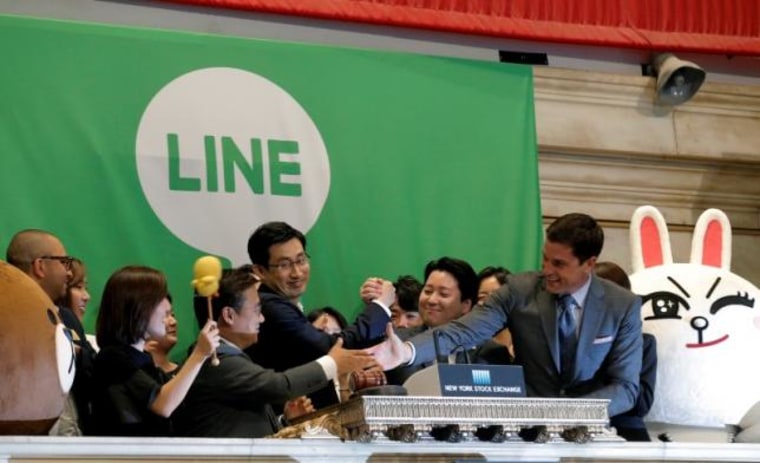After raising more than $1 billion in an IPO earlier this week, shares in the Japanese message app Line soared to 36 percent by midday trading on Thursday, in the company's market debut. Investor expectations were high — and Line reeled in a value of $9.34 billion, making it the biggest tech IPO of the year.
Analysts were hoping a strong debut could jump start the sluggish IPO market.
“It’s a good indicator," said Kathleen Smith, principal and manager of IPO-focused ETFs at Renaissance Capital. "This is a bellwether IPO for the IPO market and in particular for technology companies.”

Smith said that although the number of IPOs for the year is down by about 50 percent, those debuts delivered average returns of a little over 18 percent.
Investors do have some reservations, primarily surrounding the company’s regional footprint and its slowing growth numbers. Although its corporate parent is a South Korean internet giant, Line is not the dominant messaging app there. Two-thirds of its users are in just four countries: Japan, Taiwan, Thailand and Indonesia.
Line’s 218 million monthly active users are dwarfed by the 1 billion monthly active users of Facebook-owned WhatsApp and 900 million users of its own Messenger app, but company co-founder and chief global officer Jungho Shin was upbeat about the company’s prospects for making more money through in-app games and “stickers,” large emojis users send to one another.
The stickers, in particular, have taken on a life of their own, with a cartoon bear, rabbit and other characters turned into merchandise like plush toys, and Shin said he views their earning potential within the app as ascendant. “That is why our users open their wallet,” he said a Thursday morning interview on CNBC.
Shin also said Line would grow by expanding beyond chat to include services like ride hailing, mobile payments and music streaming, envisioning the app becoming a “one stop service” for customers.
This is the holy grail for players in an increasingly crowded platform of messaging platforms, said John Jackson, an analyst with IDC.
“Research shows users of messaging apps spend almost 23 hours a week, on average, engaged with these apps,” he said. “These things are like the new home screen, and for that reason there’s tremendous interest in owning that real estate and using it as a way to draw in third parties,” Jackson said, pointing to growing interest by technology companies in growing chat platforms to encompass a more holistic online experience.
“It basically centers around the idea that you don’t have to leave that messaging experience to book that restaurant, to call an Uber car, to read that article,” he said.
“Each of these platforms has evolved in its own way,” said Julie Ask, an analyst with Forrester Research. “It’s one of these companies where there’s a lot of uncertainty about what the future is going to be. We’re at a period now where apps are evolving into platforms,” she said. Currently, Line’s core brand identity centers around stickers and in-app games, but this almost certainly will shift over time — something Line’s early investors are banking on.
“Nobody knows what the upside is here,” Ask said. “I think there’s a lot of buzz around it right now… Some of it’s just the unknown, and the potential.”
Ultimately, Line’s advantage might lie in strategy, not size, Jackson said. “It’s about audience aggregation and what you do with it,” he said. “Ultimately, it may not be the guy with the biggest network that wins. It may be the guy that does engagement best,” he said.
